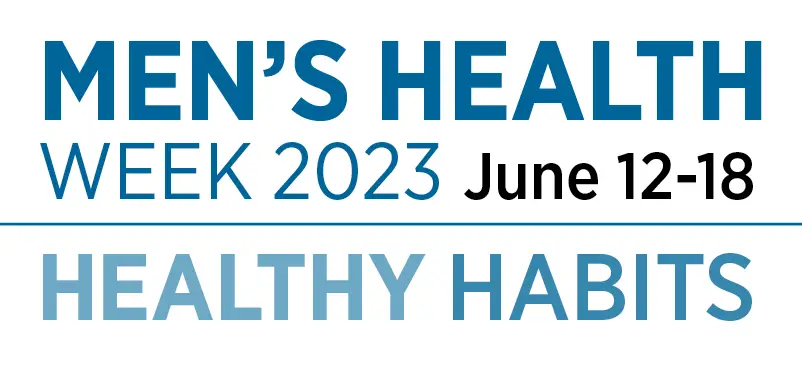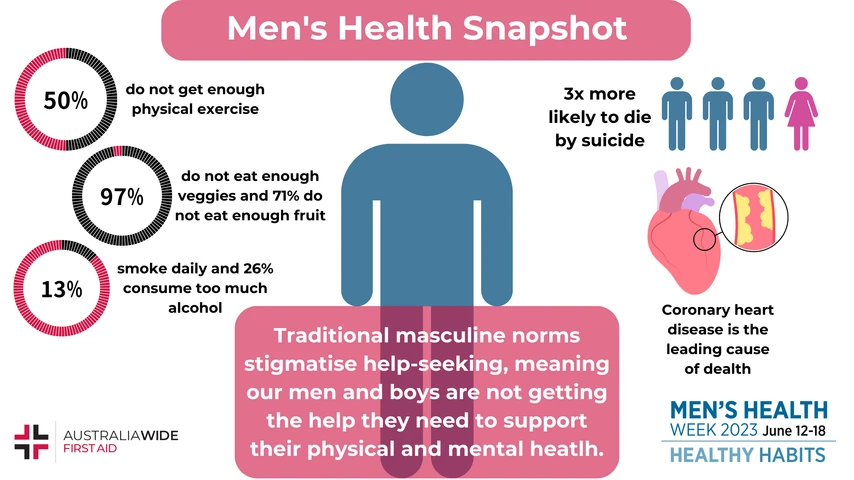International Men's Health Week - What is it?


Men’s health often takes a back seat to everything else in their lives. Social stigmas, work, and other commitments can all get in the way of men taking care of themselves in the most literal sense.
International Men’s Health Week is celebrated world-wide in the middle of June.
It was started in the US by Congress in 1994, to raise awareness of preventable health problems in men and boys. Raising awareness was designed to encourage the early detection of diseases, and prompt earlier treatment.
Since then, it has slowly spread across the globe, starting in Australia in about 2020.
Here in Australia, International Men’s Health Week is coordinated by the Centre for Male Health at Western Sydney University. They aim to provide a platform for challenging and debating key issues in men’s health, celebrate the contributions men and boys make to our society, and raise the profile of men’s health needs and outcomes.
In 2023, the theme for International Men’s Health Week is Healthy Habits – encouraging men and boys to identify small changes they can make to benefit their health and wellbeing.
The focus is not just on physical health, but also mental health and emotional wellbeing. Traditional societal expectations of men and boys have discouraged help-seeking, including for health issues, and this is an important problem to tackle.

Men face a vast array of health challenges. Compared to women, men are more likely to be overweight, experience higher rates of a range of chronic diseases, die by suicide, and have a lower life expectancy.
The vast majority of men do not eat enough fruits or vegetables, or get enough physical activity.
Almost an eighth of men smoke daily, and over a quarter consume too much alcohol.
The leading cause of death in Australian men is coronary heart disease. This is a disease which has significant lifestyle-related risk factors.
Men's experience with healthcare can vary depending on various factors such as geographic location, cultural background, socioeconomic status, and individual health needs. However, there are some common themes and considerations regardless of these factors:
To improve men's experience with healthcare, it is essential to address these challenges through various means, including education and awareness campaigns, accessible healthcare services, targeted support for underserved populations, and destigmatizing mental health issues. Encouraging men to take an active role in managing their health and providing them with the necessary resources and support can lead to better outcomes and overall well-being.
This year, take time to focus on the health and wellbeing of the men around you as well as yourself.
Ask genuine questions about their physical and mental health . Encourage booking a health check-up, or actively seeking help for known issues.
Actively support the men and boys in your life to know that taking care of their health is not only acceptable, it is a necessary priority.
The theme for this year is ‘Healthy Habits’ – work together to find small, actionable habits to improve the health and wellbeing of men and boys.

March 25, 2025
Explore non-traditional paths to sobriety, including mindfulness, yoga, nutritional therapy, and community-based support, for a personalized approach to recovery.

September 7, 2022
Menopause is the final period, when a woman, trans man, or non-binary person assigned female at birth's ovaries run out of eggs and the body can no longer ovulate. Menopause comes with several symptoms, complications, and treatment options.

July 26, 2024
Transcutaneous Electrical Nerve Stimulation (TENS) is a therapeutic method of pain relief. It utilises an electrical device that emits electrical currents and streams the impulses via electrode patches attached to the skin.